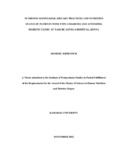NUTRITION KNOWLEDGE, DIETARY PRACTICES AND NUTRITION STATUS OF PATIENTS WITH TYPE 2 DIABETES AND ATTENDING DIABETIC CLINIC AT NAKURU LEVEL 6 HOSPITAL, KENYA
Abstract
The prevalence of Diabetes Mellitus (DM) is on a rising trend. This is worrying because
the complications are severe. Billions of dollars are also spent in the management of
DM. Cost-effective interventions are available and include dietary management.
Dietary intervention is effective though still a major challenge. Against this backdrop,
this study therefore set out to determine the Type 2 Diabetes Mellitus (T2DM) patients’
nutrition knowledge, dietary practices and nutrition status in order to develop an
effective intervention strategy. Descriptive cross-sectional design was used among 262
T2DM patients at Nakuru level 6 Hospital. Fisher’s 1998 formula, was used to
determine the sample size. Study participants were chosen using simple random
sampling, whereas the hospital and clinic were chosen purposively. A Pretest was done
at Naivasha Hospital among 10% of respondents. A semi-structured questionnaire was
used, and the collected Data was analyzed using SPSS and Nutri-survey. All research
and ethical approvals as well as permits were obtained from KUREC, NACOSTI, and
Nakuru Level 6 Hospital. Most respondents had a normal BMI; in kg/m2
103(39.3%),
low DDS 162(61.8%), and high nutrition knowledge 230(87.8%). Respondents' income
(P≤0.01), and level of education (P≤0.007) had a significant association with nutrition
knowledge. Household income (P≤0.018) and BMI; in kg/m2
(P≤0.022) had a
significant association with DDS. Participant’s random blood sugar levels had a
significant association with the participant’s carbohydrate (P≤0.034) and fiber
consumption (P≤0.016). Participants BMI; in kg/m2
also had a significant association
with DDS (P≤0.001) and energy consumption (P≤0.006). Participants with no formal
education were more likely to have good nutrition knowledge (AOR: 3.921). Similarly,
those who earn an income of ≥20000 were more likely to have good nutrition
knowledge (AOR: 1.274). Finally, participants who were younger <45 years were more
likely to have a good glycemic control (AOR: 1.319).The patients’ level of education
and income affects their nutrition knowledge, in that participants with higher level of
education and those with more income had a higher level of nutrition knowledge.
Household income and BMI; in kg/m2
affected T2DM patients’ dietary diversity in that
having a high dietary diversity leads to good nutrition status. Emphasis therefore needs
to be placed on proper dietary practices. Further research should be considered on
determining the effect of income, education and BMI; in kg/m2
on both nutrition
knowledge and dietary diversity on the predictors of T2DM such as gender, age and
income

